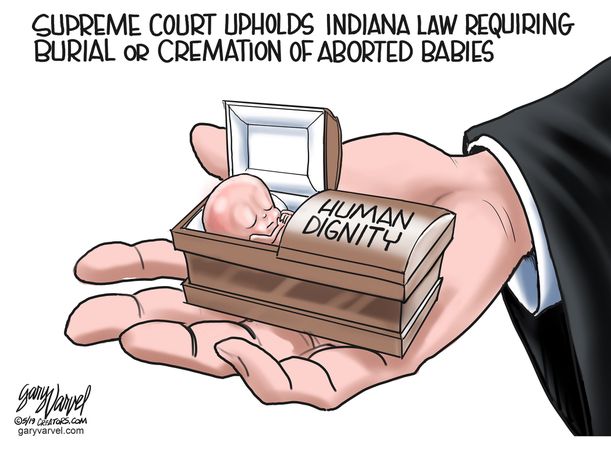They are the two longest-serving justices -- and easily the most diverse. Justice Thomas and Justice Ruth Bader Ginsburg have been on opposite sides of hundreds of issues over the years -- so Tuesday's battle of opinions wasn't anything new for the duo. What it was to many Americans, however, was enlightening. As the Washington Post points out, Justice Thomas is the only one left on the court who participated in 1992's landmark abortion case, Planned Parenthood v. Casey. He's also one of the four justices "who said they would have effectively overturned Roe if they could."
Twenty-seven years later, the justice known for his silence during arguments had plenty to say in his concurring opinion in this case-- most specifically, to Ruth Bader Ginsburg. By a 7-2 vote, the court agreed with Indiana's mandate that any bodies or remains from an abortion be disposed with dignity -- either by burial or cremation. But that was just part of the question before the court. Under the bill signed by then-Governor Mike Pence, Indiana also banned women from ending their pregnancies because of sex, race, or a "potential diagnoses" like Down syndrome. And amazingly, that was part of the law the court refused to defend.
To Justice Thomas's horror, the court essentially gave its consent to Hoosiers targeting their babies for certain traits or characteristics. "In other contexts," he wrote, "the Court has been zealous in vindicating the rights of people even potentially subjected to race, sex, and disability discrimination." But by refusing to uphold this law, he went on, the court may as well be "constitutionaliz[ing] the views of the 20th-century eugenics movement," which -- Thomas explains -- were the vision of Planned Parenthood's founder, Margaret Sanger.
Thomas spent paragraphs detailing the horrible skeletons in Planned Parenthood's closet. "Sanger herself campaigned for birth control in black communities," Thomas detailed. "In 1930, she opened a birth-control clinic in Harlem...Then, in 1939, Sanger initiated the 'Negro Project,' an effort to promote birth control in poor, Southern black communities... In a report titled 'Birth Control and the Negro,' Sanger and her coauthors identified blacks as 'the great problem of the South' -- the group with 'the greatest economic, health, and social problems.'" In other words, he warned, "The use of abortion to achieve eugenic goals is not merely hypothetical," he argued.
Ginsburg, meanwhile, duked it out with Thomas in the footnotes, writing that Indiana was imposing an "undue burden." "A woman who exercises her constitutionally protected right to terminate a pregnancy is not a 'mother,'" she insists. Then what on earth are they? Landlords? Hosts? What a woman does to her child has no impact on what she is to her child. Just as men don't magically become fathers after their babies are born. Parents are created -- just as children are -- at the moment of conception. No wonder Thomas fired back in his own footnote that Justice Ginsburg "makes little sense."
"It is not a 'waste' of our resources to summarily reverse an incorrect decision that created a Circuit split." It's time, he said to "confront the constitutionality of these laws... [W]e cannot avoid them forever." The court invented a right to abortion, he argued. Now it's "dutybound to address its scope."
[italics and colored emphasis mine]
---------------------------------------------------------------------------------------------
"MLK’s Niece Applauds Clarence Thomas for Linking Abortion, Eugenics" - Rachel del Guidice/ May 30, 2019; https://www.dailysignal.com/2019/05/30/mlks-niece-applauds-clarence-thomas-for-linking-abortion-eugenics
throughout Africa are enduring severe persecution. In May, Open Doors is focusing on African believers suffering from both oppression and physical violence. Please join us in praying with our brothers and sisters in these places where peace is elusive and conflict is ever-present.
May 31 | TURKMENISTAN - Pray with Amina,* an elderly woman. Authorities called her to the local police station and harshly questioned her about Christian meetings in her home—threatening to arrest her for following Christ.
*Names changed to protect identities








From this article, it seems that there was a law that required burial/cremation of fetus remains and banned abortion based on disability and "potential diagnoses" - the court upheld the first part, but not the second part. It's interesting that Ginsberg said that women who abort their children are not mothers. It's also interesting that Thomas drew a similarity between diagnosis-based abortion and eugenics. This is definitely an issue with high emotions and high stakes. I'm grateful that no matter which way the court decides, that the judges can render their opinions so that we know what they were thinking.
ReplyDelete-herb